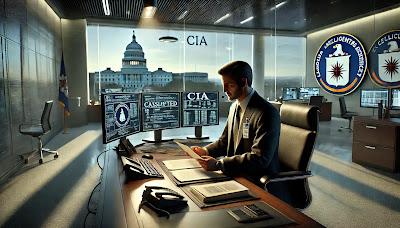 |
| Behind the Scenes: Where Secrets Shape the Nation 🌍🔍 |
The world of intelligence isn’t about
glitz and gadgets but about people, trust, and accuracy. Every decision can
save lives or spark chaos. The intelligence community (IC), key to protecting
the country, could face major setbacks with leadership upheavals that disrupt
stability and mission focus.
The
backbone of intelligence work is its people. Back in the late 1970s, CIA
Director Stansfield Turner fired 800 operations officers, devastating U.S.
human intelligence for years.
Today, similar risks loom. Plans to
overhaul the federal workforce and purge so-called “corrupt actors” could lead
to unintended fallout, impacting skilled intelligence officers who have spent
years mastering their craft.
Replacing these officers isn’t easy. CIA
Director William Burns admitted in 2021 that it takes an average of 600 days to
recruit and onboard new personnel. These jobs demand unique tradecraft,
expertise, and resilience that can’t be quickly replaced. If rhetoric or
policies push out experienced officers, the loss isn’t just personnel—it’s
decades of institutional knowledge and carefully built networks.
But losing people is just the start. The real trouble begins when those who remain are forced to bend to political agendas. Consider Project 2025, a blueprint for a second Trump term, which suggests swapping top CIA managers for “loyal” replacements. Loyalty here isn’t about defending the nation—it’s about advancing one man’s goals. Another idea? Moving parts of the CIA out of Washington, D.C., to dilute its influence. On paper, it might sound bold, but in reality, it would gut operations and push talented officers to leave. You can’t run a world-class intelligence agency when your best minds are walking out the door.
And then there’s politicization. This
isn’t just theory—Trump’s first term gave us a preview. He dismissed the IC’s
annual threat assessment on Iran, telling agency heads to “go back to school.”
This wasn’t a casual remark; it was a rebuke of months of work by experts
presenting unvarnished threats to America. Trump’s dismissal sent a dangerous
message: intelligence that doesn’t align with his narrative is disposable.
Worse yet, he tweeted a classified
satellite image—a high-resolution shot of an Iranian launch site, taken by one
of America’s most advanced surveillance satellites. This reckless move exposed
closely guarded capabilities, giving adversaries like Russia and China a
glimpse into U.S. surveillance systems they could now counter or evade. This
wasn’t just a breach of protocol; it was a breach of national security.
Trust—critical to the intelligence community—was shattered, and the damage
continues to ripple.
Trust
is the lifeblood of intelligence. Without it, partnerships crumble.
The 9/11 Commission Report highlighted how
failures in information sharing contributed to the attacks. Now imagine an IC
where officers fear their work will be ignored, misused, or politicized. That
hesitation could mean the difference between catching a threat and letting it
slip through the cracks.
The
chilling effect doesn’t stop there. Officers forced to align with political
agendas might self-censor or resist adapting to new evidence. Either way, the
result is intelligence that’s less reliable and less capable of protecting the
nation.
And what about foreign partnerships?
Intelligence is a global game, and the U.S. relies on allies to stay ahead. But
trust works both ways. When Trump took highly classified documents to
Mar-a-Lago, it sent shockwaves through the intelligence world. If allies think
their secrets are at risk of mishandling, they’ll stop sharing. And when the
flow of information dries up, America’s ability to preempt threats diminishes.
Let’s be clear: the IC isn’t perfect. It
has made mistakes. But it’s an institution built on decades of experience, one
that evolves to meet new challenges. Undermining it with politicization,
distrust, and chaos won’t make America safer—it’ll do the opposite.
Trump’s approach to the IC isn’t just a
threat to the community—it’s a threat to every American who depends on it for
safety. Because when the shield breaks, the danger doesn’t knock—it barrels
through. And by then, it’s already too late.
Robert
Morton, a member of the Association of Former Intelligence Officers (AFIO), is
an accomplished author of the Corey
Pearson- CIA Spymaster Short Story
series. Drawing from real-life intelligence operations, he crafts gripping
tales that pull readers into the high-stakes world of espionage. Each story
offers a thrilling escape—and can be enjoyed in just 20-30 minutes. Perfect for
anyone craving fast-paced spycraft!






No comments:
Post a Comment